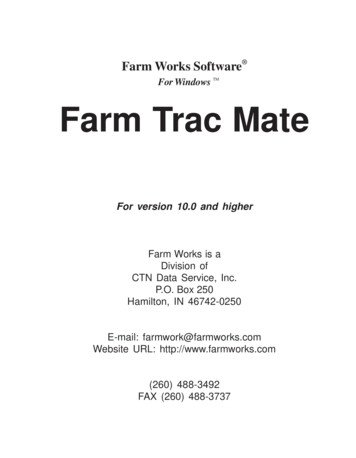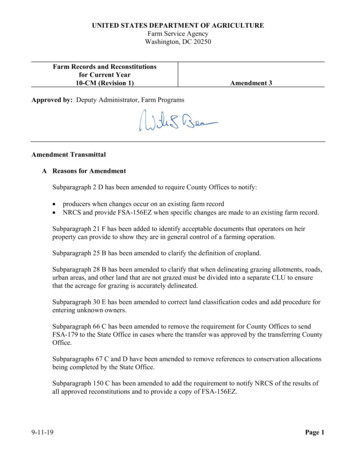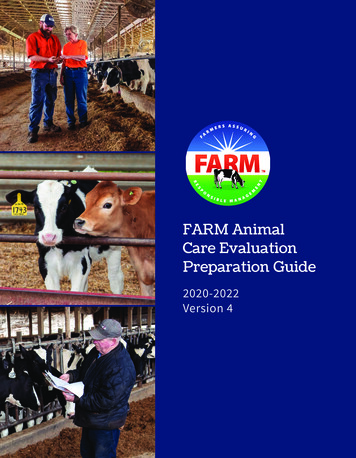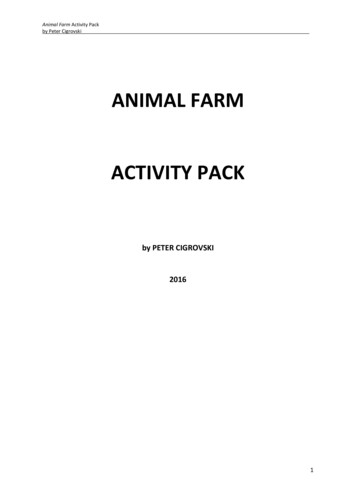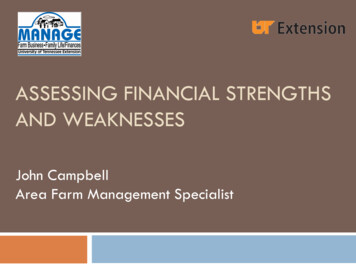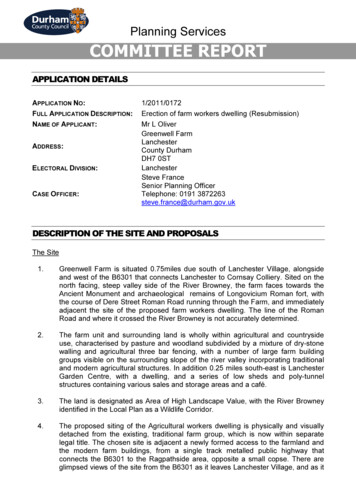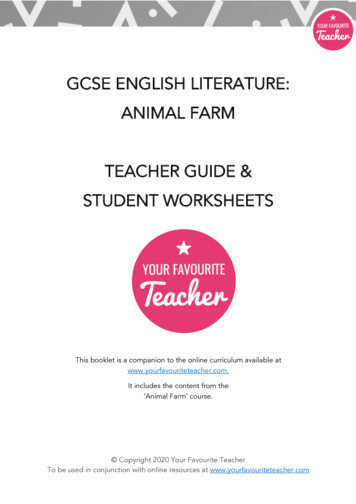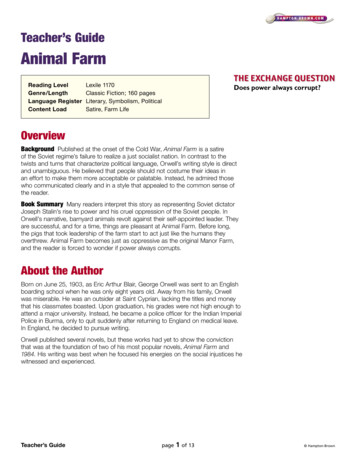
Transcription
ANIMAL FARMBY GEORGE ORWELLREVISION GUIDE
INTRODUCTIONAnimal Farm is George Orwell's satire on equality, where all barnyard animals livefree from their human masters' tyranny. Inspired to rebel by Major, an old boar,animals on Mr Jones' Manor Farm embrace Animalism and stage a revolution; theywant an idealistic state of justice and progress. However, a power-hungry pig,Napoleon, becomes a totalitarian dictator who leads the Animal Farm intooppression. "All Animals Are Equal” has added to it: “But Some Are More Equal ThanOthers."Three very important aspects of Animal Farm: Animal Farm is an allegory, which is a story in which concrete and specificcharacters and situations stand for other characters and situations so as tomake a point about them. The main action of Animal Farm stands for theRussian Revolution of 1917 and the early years of the Soviet Union.Animalism is really communism. Manor Farm is allegorical of Russia, and thefarmer Mr Jones is the Russian Czar. Old Major stands for either Karl Marx orVladimir Lenin, and the pig named Snowball represents the intellectualrevolutionary Leon Trotsky. Napoleon stands for Stalin, while the dogs arehis secret police. The horse Boxer stands in for the proletariat, or workingclass. The setting of Animal Farm is a dystopia, which is an imagined world that isfar worse than our own, as opposed to a utopia, which is an ideal place orstate. Other dystopian novels include Aldous Huxley's Brave New World, RayBradbury's Fahrenheit 451, and Orwell's own 1984. The most famous line from the book is "All animals are equal, but some aremore equal than others." This line is emblematic of the changes that GeorgeOrwell believed followed the 1917 Communist Revolution in Russia. Ratherthan eliminating the capitalist class system it was intended to overthrow, therevolution merely replaced it with another hierarchy. The line is also typicalof Orwell's belief that those in power usually manipulate language to theirown benefit
CHAPTER SUMMARIES AND ANALYSISChapter OneSummaryAfter Mr Jones, the owner of Manor Farm, falls asleep in a drunken stupor, all of hisanimals meet in the big barn at the request of Old Major, a 12-year-old pig. Majordelivers a rousing political speech about the evils inflicted upon them by their humankeepers and their need to rebel against the tyranny of Man. After elaborating on thevarious ways that Man has exploited and harmed the animals, Major mentions astrange dream of his in which he saw a vision of the earth without humans. He thenteaches the animals a song — "Beasts of England" — which they sing repeatedlyuntil they awaken Jones, who fires his gun from his bedroom window, thinking thereis a fox in the yard. Frightened by the shot, the animals disperse and go to sleep.AnalysisSeveral of the novel's main characters are introduced in this chapter; Orwell paintstheir dominant characteristics with broad strokes. Jones, for example, is presentedas a drunken, careless ruler, whose drinking belies the upscale impression he hopesto create with the name of his farm. In addition, Jones' very name (a common one)suggests he is like many other humans, and the tyranny of all mankind is animportant theme of Major's speech. His unsteady gait (suggested by the "dancinglantern" he carries) and snoring wife mark him immediately as the epitome of allthat Major says about mankind's self-absorption and gluttony. Indeed, the firstchapter presents Jones as more of an "animal" than the animals themselves, whoreacts to any disruption of his comfort with the threat of violence, as indicated by hisgunfire when he is awakened from his drunken dreams.The animals assembling in the barn are likewise characterized by Orwell in quickfashion: Major is old and wise, Clover is motherly and sympathetic, Boxer is strongyet dimwitted, Benjamin is pessimistic and cynical, and Mollie is vain and childish. Allof these characteristics become more pronounced as the novel proceeds.However, Major's speech is the most important part of the chapter, and through itOrwell displays his great understanding of political rhetoric and how it can be usedto move crowds in whichever direction the speaker wishes. By addressing hisaudience as "comrades" and prefacing his remarks with the statement that he willnot be with the others "many months longer," Major ingratiates himself to hislisteners as one who has reached a degree of wisdom in his long life of twelve yearsand who views the other animals as equals — not a misguided rabble that needsadvice and correction from a superior intellect. This notion that "All Animals Are
Equal" becomes one of the tenets of Animalism, the philosophy upon which therebellion will supposedly be based.Major's speech seems to initially echo the thoughts of Thomas Hobbes, theseventeenth-century English philosopher who wrote (in his work Leviathan) that menin an unchecked state of nature will live lives that are "poor, nasty, brutish, andshort." Unlike Hobbes, however, who felt that a strong, authoritative governmentwas required to keep everyone's innate self-interest from destroying society, Majorargues that the earth could be a paradise if the tyranny of Man was overthrown; hepresents his fellow animals as victims of oppression and incapable of anywrongdoing. The flaw in Major's thinking, therefore, is the assumption that onlyhumans are capable of evil — an assumption that will be overturned as the novelprogresses. Although he tells his listeners, "Remove Man from the scene, and theroot cause of hunger and overwork is abolished for ever," this will not prove to bethe case.As previously mentioned, Major possesses great rhetorical skill. His barrage ofrhetorical questions makes his argument more forceful, as does his imagery of the"cruel knife" and the animals screaming their "lives out at the block within a year."Major also specifically addresses Man's tyranny in terms of how he destroys families,consumes without producing, withholds food, kills the weak, and prevents themfrom owning even their own bodies. Major uses slogans as well ("All men areenemies. All animals are comrades.") because he knows that they are easily graspedby listeners as simpleminded as Boxer. The speech is a masterful example ofpersuasion, and his argument that a rebellion must take place is reminiscent of theone made by Patrick Henry to the House of Burgesses in Virginia, where he arguedthat a potential war with England was both inevitable and desirable.Of course, the irony of the entire episode in the barn is that the animals willeventually betray the ideals set forth by Major. He warns, for example, that theanimals must never come to resemble their human oppressors — but by the end ofthe novel, the tyrannical pigs are indistinguishable from their human companions.Old Major's dream of an animal utopia will quickly become a totalitarian nightmare.The song "Beasts of England" is another way in which Major rouses his audience.Although the narrator jokes that the tune is "something between Clementine and LaCucaracha," the animals find it rousing and moving. The use of a song to stir thecitizenry is an old political manoeuvre, and the lyrics of "Beasts of England"summarize Major's feelings about Man: The song describes a day when all animals(even Irish ones — a detail Orwell knew would resonate with a British readership)will overcome their tormentors. Symbols such as rings in their noses, harnesses,bits, spurs, and whips are used to convey the liberty that Major hopes will one daybe won. Images of food and plenty also contribute to the song's appeal. The singingof this powerful piece of propaganda reflects one of the novel's chief themes:Language can be used as a weapon and means of manipulation. As the animals will
later learn, characters like Napoleon and Squealer will prove even more skilled atusing words to get others to do their bidding.Glossarytushes tusks.eighteen hands high a "hand" is a four-inch unit of measurement used to describethe height of horses; eighteen hands therefore equals 72 inches.paddock a small field or enclosure near a stable, in which horses are exercised.knacker a person who buys and slaughters worn-out horses and sells their flesh asdog's meat.Clementine and La Cucaracha two popular folk songs.mangel-wurzels a variety of large beet, used as food for cattleChapter TwoSummaryAfter the death of old Major, the animals spend their days secretly planning therebellion, although they are unsure when it will occur. Because of their intelligence,the pigs are placed in charge of educating the animals about Animalism, the namethey give to the philosophy expounded by Major in Chapter 1. Among the pigs,Snowball and Napoleon are the most important to the revolution. Despite Mollie'sconcern with ribbons and Moses' tales of a place called Sugarcandy Mountain, thepigs are successful in conveying the principles of Animalism to the others.The rebellion occurs when Jones again falls into a drunken sleep and neglects tofeed the animals, who break into the store-shed in search of a meal. When Jonesand his men arrive, they begin whipping the animals but soon find themselves beingattacked and chased off the farm. The triumphant animals then destroy all traces ofJones, eat heartily, and revel in their newfound freedom. After a tour of Jones'house, they decide to leave it untouched as a museum. Snowball changes the signreading "Manor Farm" to "Animal Farm" and paints the Seven Commandments ofAnimalism on the wall of the barn. The cows then give five buckets of milk, whichNapoleon steals.AnalysisThe death of old Major marks the moment when the animals must begin to put histheory into practice. For the remainder of the novel, Orwell depicts the everwidening gulf between the vision expounded by old Major and the animals' attemptto realize it.
The names of the pigs chosen to lead the revolution reveal their personalities.Snowball's name suits the revolution in general, which "snowballs" and grows until,at the novel's end, the animal rulers completely resemble their previous masters.Napoleon's name suggests his stern leadership style (he has "a reputation forgetting his own way") and, of course, his incredible lust for power, which becomesmore pronounced with each chapter. Squealer, as his name suggests, becomes themouthpiece of the pigs. His habit of "skipping from side to side" while arguing "somedifficult point" dramatizes, in a physical way, what the smooth-talking pig will laterdo in a rhetorical sense: Every time he is faced with a question or objection, he will"skip" around the topic, using convoluted logic to prove his point. In short, heeventually serves as Napoleon's Minister of Propaganda.Like all patriots and revolutionaries, Snowball is earnest and determined to win asmany converts to his cause as he can. Two animals, however, momentarily flusterhim. Mollie's concern over sugar and ribbons is offensive to Snowball because he (asa proponent of Animalism) urges his fellow beasts to sacrifice their luxuries. To him,Mollie is a shallow materialist, concerned only with her own image and comforts.Like Mollie, Moses proves irksome to Snowball because Moses fills the heads of theanimals with tales of Sugarcandy Mountain.What Snowball (and the rest of the animals) fail to realize is that SugarcandyMountain — a paradise — is as unattainable a place as a farm wholly devoted to theprinciples of Animalism. As the biblical Moses led his people out of bondage and intothe Promised Land, Moses the raven only offers a story about an obviously fictitiousplace. The fact that the animals are so willing to believe him reveals their wish for autopia that (in the sky or on the farm) will never be found. Thus, Moses is thenovel's "religious figure," but in a strictly ironic sense, since Orwell never implies thatMoses' stories better the animals' condition. As Karl Marx famously said, "Religion is the opium of the people" — an idea shown in the animals' acceptance of Moses'tales.Once the animals rebel and drive Jones from the farm, they behave as a conqueringarmy retaking its own land and freeing it from the yoke of oppression. All thesymbols of Jones' reign — nose-rings, dog-chains, knives — are tossed into acelebratory bonfire. More important is that the animals attempt to create their ownsense of history and tradition by preserving Jones' house as a museum. Presumably,future animals will visit the house to learn of the terrible luxury in which humansonce lived, but, like Sugarcandy Mountain, this world where all animals study theiroppressors instead of becoming them is a fantasy. Similarly, the renaming of ManorFarm to Animal Farm suggests the animals' triumph over their enemy. By renamingthe farm, they assume that they will change the kind of place it has become —another example of their optimism and innocence.The Seven Commandments of Animalism, like the biblical Ten Commandments, arean attempt to completely codify the animals' behaviour to comply with a system of
morality. Like the Ten Commandments, the Seven Commandments are direct andstraightforward, leaving no room for interpretation or qualification. The fact thatthey are painted in "great white letters" on the side of the barn suggests theanimals' desire to make these laws permanent — as the permanence of the TenCommandments is suggested by their being engraved on stone tablets. Of course,like the Ten Commandments, the Seven Commandments are bound to be brokenand bound to be toyed with by those looking for a loophole to excuse theirwrongdoing.The chapter's final episode involving the buckets of milk hints at the ruthlessnessNapoleon will display as the novel progresses. One of the hens suggests that themilk be put into the animals' mash so that all can enjoy it — an Animalistic thought,to be sure, since the Seventh Commandment of Animalism states that "All animalsare equal." Note that Napoleon, however, places himself in front of the buckets andsends Snowball to lead the animals to the harvest. Already the reader can sense theboar's greed and betrayal of the most basic law of Animalism. Napoleon is using thepatriotism and drive of the other animals for his own purposes, which initially involvegaining as much control over the farm's food as he can.Glossaryporkers hogs, especially young ones, fattened for use as food.Windsor chair a style of wooden chair, esp. popular in eighteenth-century Englandand America, with spreading legs, a back of spindles, and usually a saddle seat.Midsummer's Eve the night before the summer solstice, about June 21.News of the World a popular periodical.carpet bag an old-fashioned type of traveling bag, made of carpeting.spinney a small wood; copse.Brussels carpet a patterned carpeting made of small loops of colored woolen yarnin a linen warp.Queen Victoria 1819–1901; queen of Great Britain & Ireland (1837–1901):empress of India (1876–1901): granddaughter of George III.Chapter ThreeSummaryDespite the initial difficulties inherent in using farming tools designed for humans,the animals cooperate to finish the harvest — and do so in less time than it had
taken Jones and his men to do the same. Boxer distinguishes himself as a strong,tireless worker, admired by all the animals. The pigs become the supervisors anddirectors of the animal workers. On Sundays, the animals meet in the big barn tolisten to Snowball and Napoleon debate a number of topics on which they seemnever to agree. Snowball forms a number of Animal Committees, all of which fail.However, he does prove successful at bringing a degree of literacy to the animals,who learn to read according to their varied intelligences. To help the animalsunderstand the general precepts of Animalism, Snowball reduces the SevenCommandments to a single slogan: "Four legs good, two legs bad." Napoleon,meanwhile, focuses his energy on educating the youth and takes the infant pups ofJessie and Bluebell away from their mothers, presumably for educational purposes.The animals learn that the cows' milk and windfallen apples are mixed every day intothe pigs' mash. When the animals object, Squealer explains that the pigs need themilk and apples to sustain themselves as they work for the benefit of all the otheranimals.AnalysisWhile the successful harvest seems to signal the overall triumph of the rebellion,Orwell hints in numerous ways that the very ideals that the rebels used as theirrallying cry are being betrayed by the pigs. The fact that they do not do any physicalwork but instead stand behind the horses shouting commands suggests their newpositions as masters — and as creatures very much like the humans theypresumably wanted to overthrow.When Squealer explains to the animals why the pigs have been getting all the milkand apples, he reveals his rhetorical skill and ability to "skip from side to side" toconvince the animals that the pigs' greed is actually a great sacrifice: Appealing toscience (which presumably has proven that apples and milk are "absolutelynecessary to the well-being of a pig") and lying about pigs disliking the very foodthey are hoarding, Squealer manages a great public-relations stunt by portraying thepigs as near-martyrs who only think of others and never themselves. "It is for yoursake that we drink that milk and eat those apples," Squealer explains, and hisdazzling pseudo-logic persuades the murmuring animals that the pigs are, in fact,selfless.Squealer's rhetorical question, "Surely there is no one among you who wants to seeJones back?" is the first of many times when Squealer will invoke the name of Jonesto convince the animals that — despite any discontentment they may feel — theirpresent lives are greatly preferable to the ones they led under their old master.Orwell's tone when describing the animals' reaction to Squealer ("The importance ofkeeping the pigs in good health was all too obvious") is markedly ironic and againsignals to the reader that the pigs are slowly changing into a new form of their oldoppressors.
The flag created by Snowball is, like the Seven Commandments and the preservingof Jones' house as a museum, an attempt by the animals to create a greater senseof solidarity and emphasize their victory. Snowball's Animal Committees fail,however, because in them he attempts to radically transform the animals' verynatures. Trying to create a "Clean Tails League" for the cows is as doomed to fail astrying to tame the wild animals in a "Wild Comrade's Re-education Committee."Snowball's aims may be noble and high-minded, but he is naive in thinking that hecan alter the very nature of the animals' personalities. Thus, Snowball is marked asthe intellectual theoretician of the rebellion — a characteristic that will be heightenedlater when he begins planning the construction of the windmill. Like old Major,Snowball has noble yet naive assumptions about the purity of animals' natures.Unlike Snowball, Napoleon is a pig of action who cares little for committees. Hisassumption that the education of the young is the most important duty of the animalleaders may sound like one of Snowball's altruistic ideas — but he only says this toexcuse his seizure of the new pups that he will raise to be the vicious guard dogs heuses to terrorize the farm in later chapters.Note that the characters of other animals are further developed in this chapter.Boxer, for example, is portrayed as a simple-minded but dedicated worker: Hecannot learn any more than four letters of the alphabet, but what he lacks inintelligence he more than makes up for in devotion to the farm. His new motto — "Iwill work harder" — and request to be called to the field half an hour before anyoneelse marks him as exactly the kind of animal that the pigs feel confident incontrolling. When there is no thought, there can only be blind acceptance. (LikeBoxer, the sheep are content with repeating a motto instead of engaging in any realthought. Their repetition of "Four legs good, two legs bad" will continue throughoutthe novel, usually when Napoleon needs them to quiet any dissention.)Mollie's vanity is stressed in her reluctance to work during the harvest — she cannotdevote herself to any cause other than her own ego. Thus, when she is taught toread, she refuses to learn any letters except the ones that spell her name. UnlikeSnowball (and his intellectual fancies) or Napoleon (and his ruthlessness), Molliewillingly abstains from any part in the political process.Old Benjamin's character is likewise developed in this chapter. Orwell points out thatBenjamin "never changed" and that, when asked about the rebellion, only remarks,"Donkeys live a long time. None of you has ever seen a dead donkey." The otheranimals find this reply a "cryptic" one, but the reader understands Benjamin's point:He is wary of becoming too enthusiastic about the rebellion, since he knows that anynew government can succumb to the temptation to abuse its power. Later, when theanimals learn to read, Benjamin never does, since he finds "nothing worth reading."His cynicism is out-of-place with the patriotism felt by the other animals, but hecannot be convinced that the rebellion is a wholly noble cause — and, afterwitnessing the actions of the pigs, neither can the reader.
Glossarycutter a small, light sleigh, usually drawn by one horse.whelped gave birth to: said of some animals; here, meaning a litter of puppies wasborn.windfalls apples blown down by the wind from trees.Chapter FourSummaryAs summer ends and news of the rebellion spreads to other farms (by way ofpigeons released by Snowball and Napoleon), Jones spends most of his time in apub, complaining about his troubles to two neighboring farmers: Pilkington andFrederick.In October, Jones and a group of men arrive at Animal Farm and attempt to seizecontrol if it. Snowball turns out to be an extraordinary tactician and, with the help ofthe other animals, drives Jones and his men away. The animals then celebrate theirvictory in what they call "The Battle of the Cowshed."AnalysisSnowball and Napoleon's decision to send pigeons to neighbouring farms to spreadnews of Animal Farm is — like their creation of "Animal Hero, First Class" at the endof the chapter — an attempt to heighten the gravity and scope of the rebellion. Byinforming other animals about Animal Farm, the pigs hope to instigate rebellionselsewhere and eventually live in the world depicted in old Major's dream.The scene of Jones commiserating in the Red Lion with Pilkington and Frederickportrays the humans as exactly the greedy self-centred beings that the animalswished to overthrow. Although the two neighbouring farmers sympathize with Jones"in principle," Orwell states that each is "secretly wondering whether he couldsomehow turn Jones' misfortune to his own advantage." Note also that Pilkington'sfarm, Foxwood, is in a "disgraceful condition" and that Frederick is "perpetuallyinvolved in lawsuits" and has a "name for driving hard bargains." In direct contrastto the principles of Animalism, the humans live by a credo of self-interest and desirefor material gain. (Of course, the reader has already seen how Napoleon is betrayingthe principles of Animalism, as he becomes more and more like these men in thepub.)According to Frederick and Pilkington, the animals are "rebelling against the laws ofnature," with "nature" in this context referring to a world where humans control allaspects of animals' lives and use them for their own material gain. Of course, what
seems "natural" to the humans is not what seems "natural" to the animals, and it isworth noting that all attempts in the novel to change the natures of both humansand animals fail.Driven by fear and their perception that other animals at neighbouring farms arebeginning to become inspired by the rebels' example, Jones attempts to take backwhat is his — but his attempt at military prowess in this case only further depictshim as impotent and inept. After being muted upon by the pigeons, Jones is knockedinto a dung heap — a fitting place for him, in the eyes of his animal enemies. Hisrunning from the farm concludes a scene obviously serious for the characters but —with its panic and application of Caesar’s tactics to a barnyard melee — comic to thereader.Boxer's teary-eyed concern over the possible death of the stable-lad reinforces hissimple-mindedness and foreshadows the fact that he will be unable to survive in aplace as harsh as Animal Farm is soon to become. The image of the great horsetrying to turn the boy over with his hoof while he laments, "Who will not believe thatI did not do this on purpose?" contrasts the one of Snowball, with the blood drippingfrom his wounds, stating, "War is war. The only good human being is a dead one."Unlike Boxer, who wishes no real harm even to his enemies, Snowball cares little forthe possible regrets one of his soldiers may face. To him, death is an inevitable byproduct of revolution, as he remarks during his funeral oration for the dead sheep.The chapter ends with the implication that Animal Farm is becoming a placegrounded more in military might than agrarian industry. The creation of militarydecorations, the naming of the battle, and the decision to fire Jones' gun twice ayear all suggest the animals' love of ceremony and the slow but sure transformationof Animal Farm into a place governed by martial law more than the SevenCommandments of Animalism.Chapter FiveSummaryWinter comes, and Mollie works less and less. Eventually, Clover discovers thatMollie is being bribed off Animal Farm by one of Pilkington's men, who eventuallywins her loyalties. Mollie disappears, and the pigeons report seeing her standingoutside a pub, sporting one of the ribbons that she always coveted.The pigs increase their influence on the farm, deciding all questions of policy andthen offering their decisions to the animals, who must ratify them by a majorityvote. Snowball and Napoleon continue their fervent debates, the greatest of whichoccurs over the building of a windmill on a knoll. Snowball argues in favour of thewindmill, which he is certain will eventually become a labour-saving device;Napoleon argues against it, saying that building the windmill will take time and effort
away from the more important task of producing food. The two also disagree onwhether they should (as Napoleon thinks) amass an armoury of guns or (asSnowball thinks) send out more pigeons to neighbouring farms to spread news ofthe rebellion. On the Sunday that the plan for the windmill is to be put to a vote,Napoleon calls out nine ferocious dogs, who chase Snowball off the farm. Napoleonthen announces that all debates will stop and institutes a number of other new rulesfor the farm.Three weeks after Snowball's escape, Napoleon surprises everybody by announcingthat the windmill will be built. He sends Squealer to the animals to explain that thewindmill was really Napoleon's idea all along and that the plans for it were stolenfrom him by Snowball.AnalysisThe defection of Mollie marks her as an even greater materialist than she hadappeared to be earlier in the novel. The fact that she is bribed away from AnimalFarm with sugar and ribbons — two items that Snowball condemned as unnecessaryfor liberty in Chapter 2 — shows her desire for luxury without making the necessarysacrifices to obtain it. She is a defector from the politics of Animal Farm and is nevermentioned by the other animals, who find her abandonment of Animalism and therebellion shameful. Despite their implied condemnation, however, the pigeons doreport that "She appeared to be enjoying herself" — much more so than the animalswho remain on the farm. Mollie may be politically shallow in the eyes of her formercomrades, but she does manage to secure herself a much more comfortable life,which raises the question of whether one is better off living well with one's enemiesor suffering with one's comrades. The novel eventually suggests that Mollie did, infact, make a wise decision in leaving Animal Farm, although (to be fair) she did notdo so because of any political or moral motives.At this point, the pigs have gained more power: Earlier, they were "supervisors," butnow they decide "all questions of farm policy." While these decisions still need to beratified by the other animals, Orwell suggests that the pigs are gaining ground at aslow but steady rate. But with the "bitterly hard weather" that arrives that winter, sodo "bitterly hard" debates increase between Snowball and Napoleon. Actually,"debate" is hardly the correct term, since only Snowball attempts to use rhetoric andlogic to sway the other animals — Napoleon uses a number of what Squealer willlater call "tactics" to get his way. For example, Napoleon spends time during theweek training the sheep to break into their "Four legs good, two legs bad" bleatingduring "crucial moments" in Snowball's speeches; packing the meetings with his ownunwitting supporters is Napoleon's calculated strategy here. His unleashing of thenine dogs later in the chapter is Napoleon's ultimate "debating technique": Violence,not oratory, is how Napoleon settles disagreements.
The windmill itself is a symbol of technological progress. Snowball wants it to bebuilt because he thinks it will bring to the farm a degree of self-sufficiency — whichaccords with the principles of Animalism. Napoleon, however, cares nothing for thewindmill (and even urinates on Snowball's plans for it) because he is only concernedwith establishing his totalitarian rule. At the debate on the windmill, Snowball arguesthat after it is built, the animals will only need to work three days a week, whileNapoleon argues that "if they wasted time on the windmill they would all starve todeath."Thus, Snowball is a leader who looks forward and considers the future of his nation,while Napoleon thinks only of the present, since his vision of the future is one inwhich he is in full control over animals who have no time for leisur
Animal Farm is an allegory, which is a story in which concrete and specific characters and situations stand for other characters and situations so as to make a point about them. The main action of Animal Farm stands for the Russian Revolution of 1917 and the early years of the Soviet Union. Animalism is really communism. Manor Farm is .
